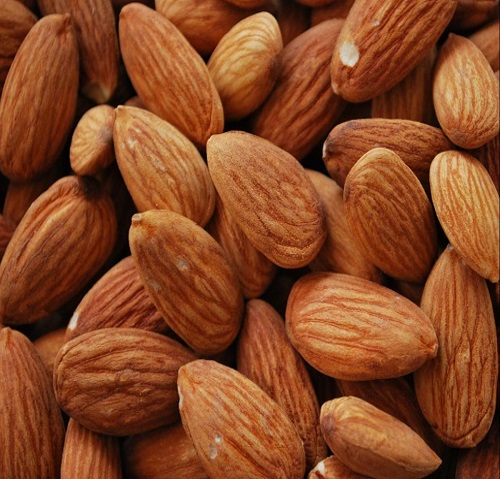- You have no items in your shopping cart
- Subtotal: ₹0.00
The health benefits of almonds
Almonds contain vitamins, minerals, protein, and fiber, and so they may offer a number of health benefits. Just a handful of almonds — approximately 1 ounce — contains one-eighth of a person’s daily protein needs.
People can eat almonds raw or toasted as a snack or add them to sweet or savory dishes. They are also available sliced, flaked, slivered, as flour, oil, butter, or almond milk.
People call almonds a nut, but they are seeds, rather than a true nut.
Almond trees may have been one of the earliest trees that people cultivated. In Jordan, archaeologists have found evidence of domesticated almond trees dating back some 5,000 years.
In this article, find out some of the reasons for almonds being a healthful choice.
Benefits of almonds
There are several potential health benefits that scientists have associated with almonds.
1) Almonds and cholesterol
Almonds are high in fat, but it is unsaturated fat. This type of fat does not increase the risk of low-density lipoprotein (LDL) or “bad” cholesterol.In addition, almonds contain no cholesterol.
A studyTrusted Source from 2005 suggests that consuming almonds may:
- increase vitamin E levels in the plasma and red blood cells
- lower overall cholesterol levels
According to these researchers, vitamin E is an antioxidant that can help stop the oxidization process that causes cholesterol to clog the arteries.
Further studies have found similar results.
Authors of a 2018 reviewTrusted Source note that the nutrients in almonds may help boost or maintain levels of high-density lipoprotein (HDL) or “good” cholesterol. They advised people to consume around 45 grams (g) a day of almonds to protect heart health.
2) Almonds and cancer risk
A 2015 study looked at nut consumption and cancer risk.
The authors identified a two to three times lower risk of breast cancer among individuals who consumed higher quantities of peanuts, walnuts, and almonds, compared with those who did not.
They concluded that “peanuts, walnuts, and almonds appear to be a protective factor for the development of breast cancer.”
3) Almonds and heart disease
Almonds, along with other nuts and seeds, may help improve lipid, or fat, levels in the blood. This can benefit heart health.
In a study from 2014, scientists found that almonds significantly increased the levels of antioxidants in the bloodstream, reduced blood pressure, and improved blood flow. The participants were all healthy males from 20–70 years of age who took 50 g of almonds per day for 4 weeks.
The researchers believe this may be due to:
- vitamin E, healthy fats, and fiber, which help a person feel full
- the antioxidant impact of flavonoids
They recommend eating a handful of almonds a day to obtain these benefits.
High blood pressure increases the risk of heart disease. Which foods can help a person lower their blood pressure?
4) Almonds and vitamin E
Almonds contain relatively high levels of vitamin E. Vitamin E contains antioxidants, such as tocopherol. One ounceTrusted Source (28.4 g) of plain almonds provides 7.27 milligrams (mg) of vitamin E, which is around halfTrusted Source a person’s daily requirement.
Vitamin E and other antioxidants help prevent oxidative damage in the body. This damage can occur when too many free radicals accumulate.
Free radicals result from natural bodily processes and environmental stresses. The body can eliminate many of them, but dietary antioxidants help remove them, too. High levels of free radicals can cause oxidative stress, resulting in damage to cells. This can lead to various diseases and health problems.
Scientists have also tentatively linked a higher vitamin E intake with a lower risk of Alzheimer’s disease.
A 2016 reviewTrusted Source notes that one antioxidant in vitamin E, alpha-tocopherol, may play a role in reducing the risk of cancer. However, more studies are needed to confirm this as findings have been contradictory overall. Find out which other foods are a good source of vitamin E.
5) Almonds and blood sugar
There is some evidence that almonds may help manage blood sugar levels.
Many people with type 2 diabetes have low magnesium levels. A deficiency is common among those who have difficulty managing their blood sugar levels. Scientists have suggestedTrusted Source there may be a link between magnesium deficiency and insulin resistance.
In a 2011 study, 20 people with type 2 diabetes ate 60 g of almonds a day for 12 weeks. Overall, they saw improvements in:
- blood sugar levels
- blood lipid, or fat, levels
- One ounceTrusted Source of almonds provides 76.5 mg of magnesium, or between 18% and 24% of an adult’s daily requirementTrusted Source.Some experts suggest using magnesium supplements to improve blood sugar profiles, but almonds may offer a suitable dietary source instead.Learn more about how nuts may help people with diabetes.
-
Nutrition
The table below shows the amount of each nutrient in one ounceTrusted Source (28.4 g) of almonds. This is approximately equivalent to a handful of almonds or around 23 almond kernels.
It also shows how much an adult needs of each nutrient, according to the 2015–2020 Dietary Guidelines for AmericansTrusted Source. Recommendations vary according to the individual’s sex and age.
-
Nutrient Amount in 1 ounce Daily adult requirement Energy (calories) 164 1,800–3,000 Carbohydrate (g) 6.1, including 1.2 g of sugar 130 Fat (g) 14.2, of which 12.4 g is unsaturated 20%–35% of daily calories Fiber (g) 3.5 25.2–30.8 Protein (g) 6.0 46–56 Calcium (mg) 76.3 1,000–1,200 Iron (mg) 1.0 8–18 Magnesium (mg) 76.5 310–420 Phosphorus (mg) 136 700 Potassium (mg) 208 4,700 Zinc (mg) 0.9 8–11 Copper (mg) 0.3 900 Manganese (mg) 0.6 1.8–2.3 Selenium (micrograms or mcg) 1.2 55 Folate (mcg, DFE) 12.5 300–400 Vitamin E (mg) 7.27 15 Cholesterol 0 No data The B vitamins, choline, and protein may all be lacking in a plant-based diet. People who follow a vegan diet can supplement their needs by eating almonds.
-
Pricing
Pricing may change without notice due to price in markets is fluctuated time to time. Please contact us for current prices and availability before placing order. Discounts are available for volume orders.
Order Minimum
For the export, the orders minimum for any product is 100 Kilogram (Kg). For your needs less than one 100 Kg please see our Item Packets line of products.
Shipping
Orders from India are shipped through Blue Dart, FedEx, Delivery, Gati, Express bees and India Postal Services depending on the pin code, cost and time parameters. Orders from abroad port dispatched are Kolkata and Vishakhapatnam. Freight costs are calculated at Checkout, and are prepaid and added to your invoice.
Payment
We accept Cash in Advance (CID), Cheque, Net Banking, Visa, MasterCard, American Express, Letter of Credit (L/C), Telegraphic Transfer (T/T). Please call for information.
Returns And Cancellations (Not for Food items)
Standard products canceled, called within 48 hours of the scheduled shipping date. We are sorry, but Custom Products cannot be canceled after the order is delivered. Returns of Standard Products and Individual Species must be made in the original unopened packaging within two weeks of delivery. Returns of Standard Products and Individual Specie are subject to a restocking charge of 20% plus freight charges. Custom Products may not be returned.
Warranty
The product is guaranteed to be as described on the Product Tag. Liability is limited to refund or replacement. All orders are subject to acts of nature and availability.









Customer reviews
Reviews
There are no reviews yet.
Write a customer review